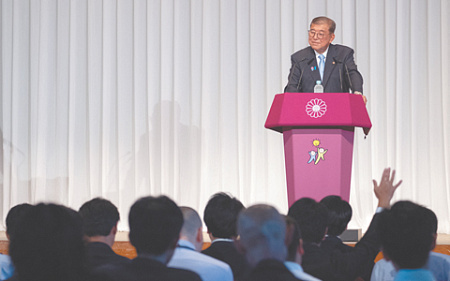
Japanese Prime Minister Shigeru Ishiba has defiantly rejected calls for his resignation following a significant election defeat, arguing that his continued leadership is essential to navigate high-stakes trade negotiations with the United States. The announcement came Monday after his ruling Liberal Democratic Party (LDP) and its coalition partner, Komeito, lost their majority in the parliament’s upper house, plunging the government into a fresh crisis.
The election results delivered a sharp rebuke to the Prime Minister just nine months into his tenure. The ruling coalition secured only 47 of the 124 contested seats in the House of Councillors, falling short of the 50 required to maintain control. The opposition now holds a narrow majority with 126 seats to the coalition’s 122. This loss compounds the LDP’s troubles, coming after it lost its majority in the more powerful lower house last October, forcing Ishiba to lead a fragile minority government.
At a press conference, Ishiba acknowledged the “stern verdict” from the public and offered a formal apology, but he ruled out a cabinet reshuffle or stepping down. He cited the overriding need to avoid a “political vacuum” while Japan faces formidable challenges, including national security and the impending deadline in trade talks with the Trump administration. With Washington threatening to impose steep tariffs if a deal is not reached by August 1, supporters argue that a change in leadership would critically weaken Japan’s negotiating position.
The electoral defeat was largely fueled by widespread domestic discontent over the economy. With inflation hitting a stark 3.6% annually, voters have been squeezed by the rising cost of living, particularly a sharp spike in rice prices. During the campaign, the opposition’s call to cut the consumption tax resonated far more with the public than the ruling party’s proposal of targeted cash handouts for low-income families, a policy analysts say failed to address the core economic anxieties of the electorate.
Ishiba’s decision to cling to power has intensified pressure from within his own party. With public approval ratings hovering at a dismal 20%, influential LDP members have publicly called for him to take responsibility for the defeat and resign. Meanwhile, the revitalized opposition is reportedly considering a motion of no-confidence in the government. Analysts note that while there is no clear successor ready to take charge, the internal debate over Ishiba’s future is set to escalate dramatically.
Japan now enters a period of profound political turbulence with an uncertain path forward. It is historically unprecedented for the LDP to lose its majority in both houses of parliament and still retain power. A weakened Ishiba government faces the immense challenge of finalizing a trade deal with the U.S. while also fending off pressure from Washington to dramatically increase its defense spending. The instability in Tokyo raises critical questions for the future of the U.S.-Japan alliance and strategic balance in Asia.
